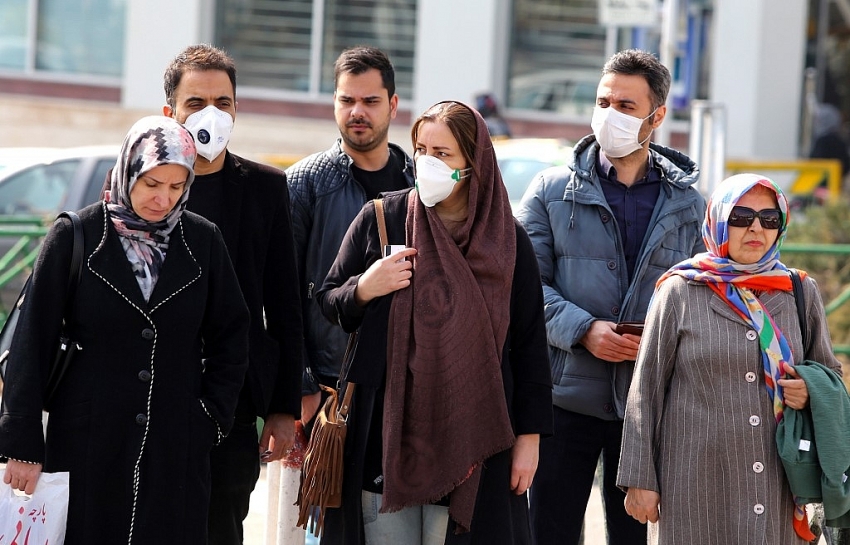Apparel firms cushion COVID-19 blow
 |
| Apparel firms cushion COVID-19 blow. Photo ATTA KENARE / AFP |
The Ministry of Labour, Invalids and Social Affairs has just submitted to the prime minister a fresh report on the coronavirus (COVID-19), involving the survey of over 180,000 enterprises in 30 cities and provinces nationwide. Results showed that 553 enterprises have had to scale down their performance, and another 322 have completely shut down.
Further details revealed that as many as 9,000 employees have been hurt by the epidemic. Two-thirds of them are working in agri-forestry-fisheries, water and waste treatment, management, and logistics. Besides that, the epidemic outbreak is causing ever more hardship to enterprises involving textiles and garments, hotels, restaurants, and manufacturing.
According to the report, businesses of many sectors lamented over their difficulties in maintaining operations – however, many have made efforts to improve the livelihoods of their staff. They also insisted that labour suspension is only a temporary solution.
Leather footwear exporter Golden Top Co., Ltd., founded in 1995 in the northern port city of Haiphong, allowed its workers a month off to protect them from the outbreak. A company representative told VIR that the delay in importing raw materials from China forced operations to be suspended.
In another case, an anonymous source from a large Japanese manufacturer of cameras and printers, which operates many big factories in Vietnam, also told VIR, “Currently, suppliers from China are closed indefinitely, leading to the interruption of manufacturing of components.”
On the flip side, enterprises are finding solutions to temporarily overcome the impact from COVID-19. Vu Mai, director of human resources at Sheraton Hanoi Hotel, said, “The hotel staff have been on a leave of absence since late last year. Therefore, we decided to arrange a temporary period of time for our staff to be absent but still ensure their income.”
Elsewhere, a Stateway Vietnam Footwear Co., Ltd. representative said that the company is working, albeit at half strength, as it still has raw materials imported from before the Lunar New Year, and can maintain manufacturing into next month. “Also, we have arranged an alternative timetable for staff to protect their health as well as guarantee their salary. We hope transportation between the two countries will soon recover as the epidemic has taken a toll on our productivity,” the representative said.
Meanwhile, businesses like TNG Investment and Trading JSC also have their own solutions to cope with the situation. TNG chairman Nguyen Van Thoi said, “Learning from the fact that years ago the Chinese take a long time off for the holidays, TNG has imported raw material for the whole first quarter of this year. Along with that, TNG also discussed with customers to choose Vietnam or South Korea instead to maintain raw materials for production. Thus, labour suspension has yet to happen at TNG.”
Small businesses might be the biggest victims as the epidemic’s impacts are still unpredictable. Others may even take the chance to clear out inventory, hoping that transportation will recover in good time.
COVID-19 has already taken a heavy toll on enterprises of many economic sectors in the country. However, those engaging in chemicals as well as textiles and garments have been nosing out opportunities, with an increased workload coupled with maintaining or even increasing their employment.
Specifically, regarding the hand-wash thirst recently, Vinachem subsidiaries Hanoi Soap JSC and Lix Detergent JSC, result introduced new products in order to meet the rising demand.
According to statistics published by the Ministry of Health, Vietnam boasts 38 businesses manufacturing medical face masks, 11 of which are large-scale manufacturers with the total capacity of 1.23 million units per day. Dong Xuan Knitting Sole Member LLC, for instance, usually provides markets with 50,000 masks. However, amid the health scare it has expanded the manufacturing line to increase capacity to 300,000 units per day.
Dai Uy Pharmaceutical JSC, which specialises in supplementary foodstuff products and has invested into its mask manufacturing lines in the last year, noted that on normal days, the company operates at a capacity of 50,000 masks. But now, all manufacturing lines have to run all day at maximum capacity to provide 100,000 units a day.
Cao Huu Hieu, deputy general director of Vietnam National Textile and Garment Group, told VIR that in the first quarter of this year, the parent company and member companies have full orders to export. As manufacturing of textile and garment products cannot cease, and simultaneously the activity to process masks is in a hurry, the company had to propose partners to delay delivery deadlines for export products in order to allocate workers to produce masks.”
“The group has approximately 80,000 employees working on textiles and garments but now has allocated 2,000 workers for mask production with the plan to provide six million units in February,” Hieu said. “In order to complete export orders and reach the production target for masks, our workers have to work extra hours, even during the weekends, and therefore the group has had to pay more.”
Along with textile and garment businesses, some foodstuff makers have also created new items as well as changed production plans to combat the impacts of COVID-19. For example, Lavifood JSC in the Mekong Delta province of Long An specialises in providing fruit, vegetables, and agricultural products on the global market. While the selling price of dragon fruit has dropped due to halting exports to China, Lavifood collected dragon fruit to process numerous frozen, dried, soft, and juiced products for the local market with the capacity of 500 tonnes of material a day. This way, the company did not have to suspend operations or let go of workers.
| Ngo Thi Ngoc Lan - Regional director, Navigos Research
The prolonged coronavirus outbreak has been putting pressure on industries dependent on China. This has been illustrated by tourism and manufacturing, which have been experiencing great hardship. China is a high-consumption market, so industries with manufacturing activities in the nation have all suffered from the coronavirus impact. Blocking business performance has worsened its personnel structure and also recruitment. Looking back at the SARS outbreak 17 years ago, companies can take at least one year to recover. However, with the more serious effects of coronavirus, the time to overcome may be two or three years for some. Our observations state that hospitality, tourism services, and manufacturing have been mired in the health crisis. Tours have been cancelled due to a lack of arrivals, especially from China. Festivals and events have been forced into postponement or cancellation, so luring overseas visitors has been limited recently. Moreover, small-scale businesses have temporarily cut a third of staff, or even half in some cases. Big businesses, despite not cutting personnel, cannot avoid the impact on their revenue either, if the health crisis is prolonged. Recruitment in tourism, restaurants, and hospitality has been stagnant. Many related companies have had to call off or delay recruitment plans and campaigns for 2020. Regarding manufacturing activities, China is the global leader with a tremendous amount of good supply. As a result, closing the border with the country has been affecting local businesses’ material supply imported from there. Some of the factories in Vietnam have been halting operation due to lack of ability in importing goods from China. That has resulted in staff being held back from working. Companies that demand larger recruitment to shift their business from China to Vietnam have been delaying plans and cannot fix a time to restart. Moreover, some highly-skilled labourers from China cannot yet get back to work. Recruitment in the local market has been difficult because most candidates refuse to work at places near the epidemic. Applicants from China and Hong Kong cannot exit the country and take part in interviews, so recruiters have cancelled them because of the continued outbreak. To overcome the burden, companies working in tourism and hospitality should keep recruiting key personnel to soon recover business performance after the epidemic blows over. Also, businesses should re-train current personnel to enhance their productivity once the crisis passes by. Furthermore, companies should look to diversify sources of import material supplies. They should also keep maintaining recruitment campaigns and retain key personnel because they play a big role in improving performance when a crisis like the virus outbreak occurs. |
What the stars mean:
★ Poor ★ ★ Promising ★★★ Good ★★★★ Very good ★★★★★ Exceptional
Related Contents
Latest News
More News
- Foreign leaders extend congratulations to Party General Secretary To Lam (January 25, 2026 | 10:01)
- 14th National Party Congress wraps up with success (January 25, 2026 | 09:49)
- Congratulations from VFF Central Committee's int’l partners to 14th National Party Congress (January 25, 2026 | 09:46)
- 14th Party Central Committee unanimously elects To Lam as General Secretary (January 23, 2026 | 16:22)
- Worldwide congratulations underscore confidence in Vietnam’s 14th Party Congress (January 23, 2026 | 09:02)
- Political parties, organisations, int’l friends send congratulations to 14th National Party Congress (January 22, 2026 | 09:33)
- Press release on second working day of 14th National Party Congress (January 22, 2026 | 09:19)
- 14th National Party Congress: Japanese media highlight Vietnam’s growth targets (January 21, 2026 | 09:46)
- 14th National Party Congress: Driving force for Vietnam to continue renewal, innovation, breakthroughs (January 21, 2026 | 09:42)
- Vietnam remains spiritual support for progressive forces: Colombian party leader (January 21, 2026 | 08:00)


 Tag:
Tag:




















 Mobile Version
Mobile Version